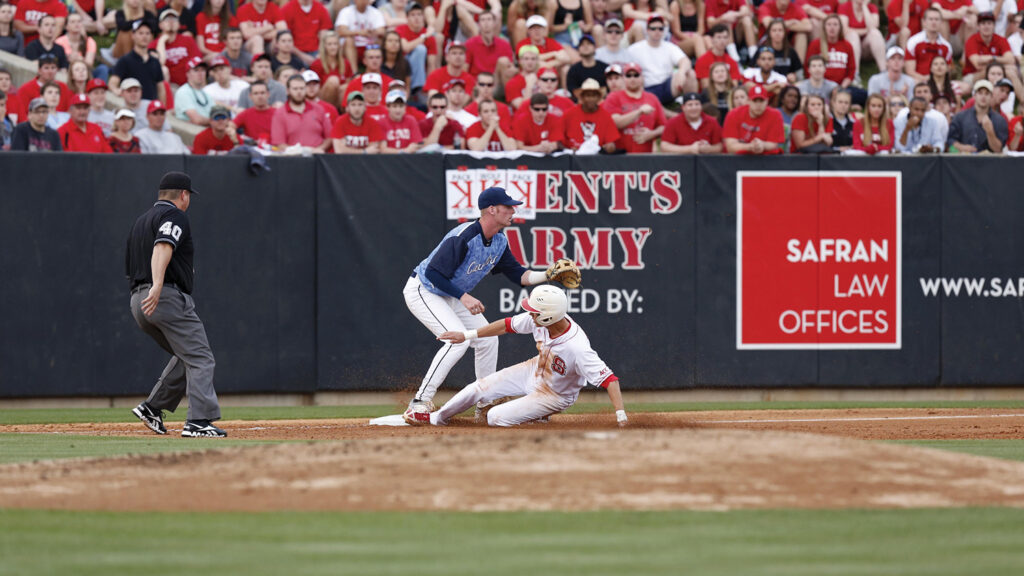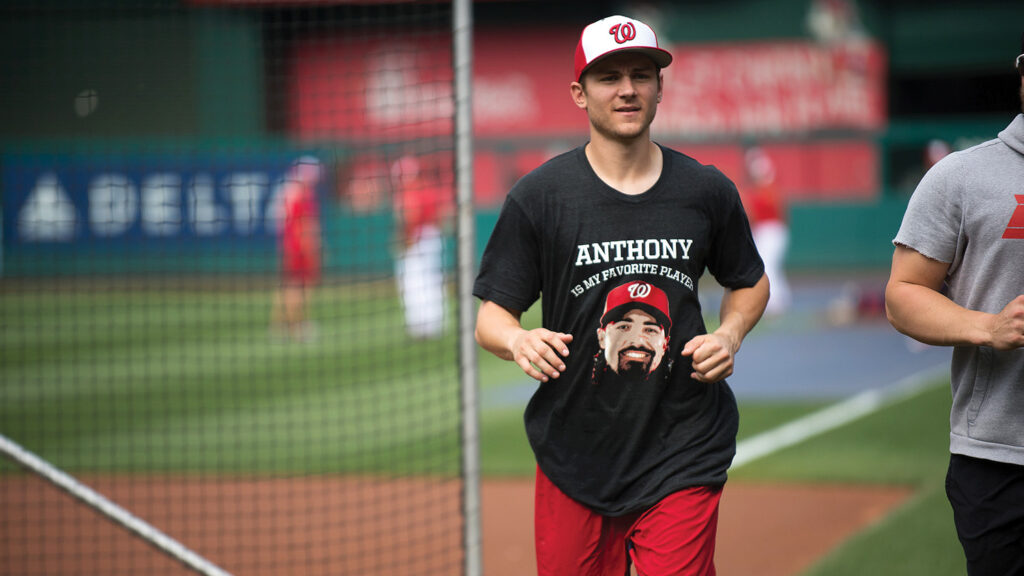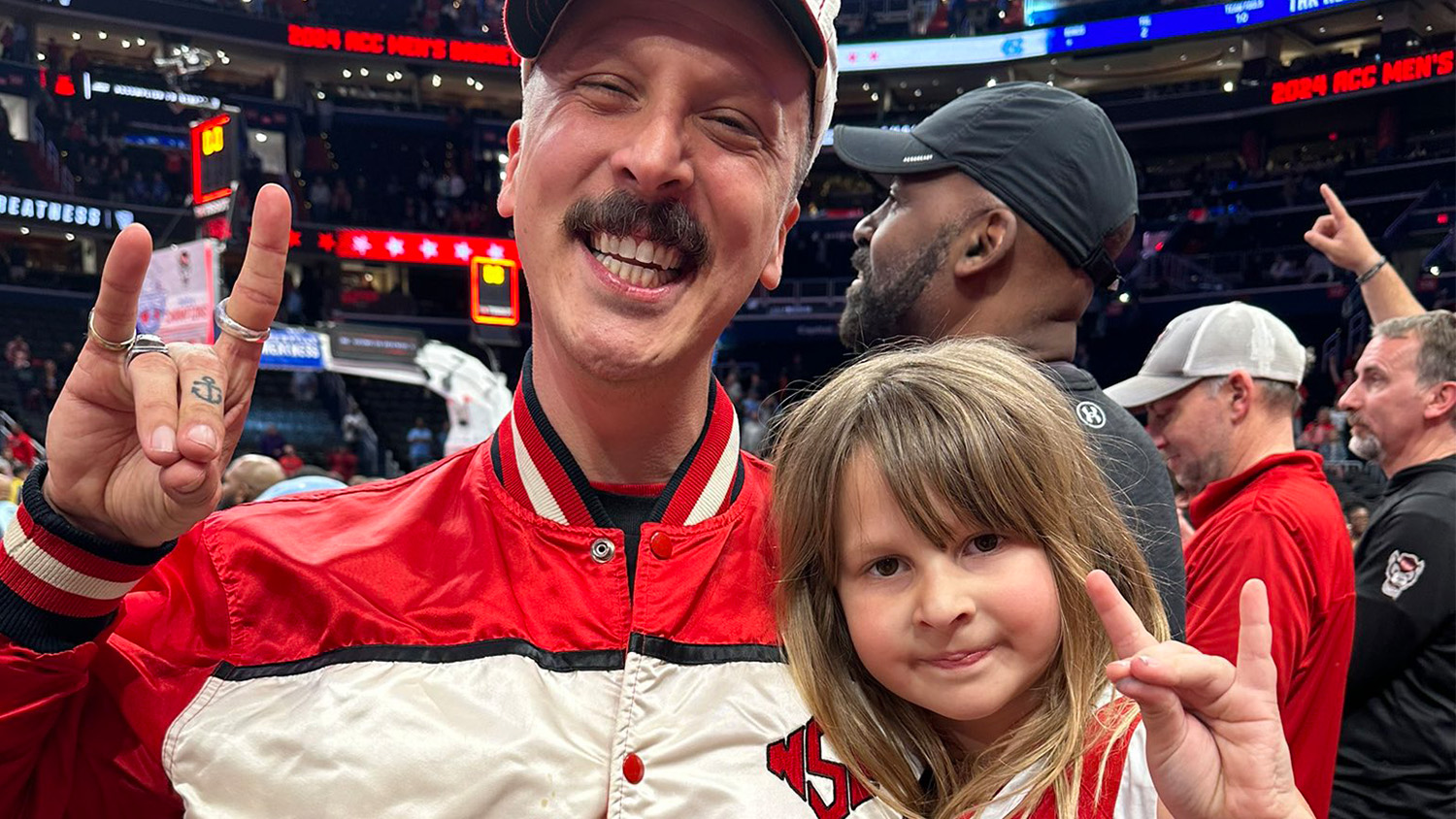Stealing the Show
Long before Trea Turner signed with the Philadelphia Phillies this past offseason, NC State magazine profiled in Summer 2018 how he has used his sneaky power and his not-so-sneaky speed to become one of Major League Baseball’s brightest young stars.

To pull off a steal in baseball, a player has to have both instinct and speed. A player has to keep his focus on the base ahead and not where the ball is as he plows through the dirt and dust. It’s unpredictable. That’s the true beauty of a steal. At its essence, it’s a gamble. A player has to know when the right time is to go. He has to know — cue the Kenny Rogers here — when to hold ’em and when to fold ’em.
Washington Nationals shortstop Trea Turner knows everything about when to run.
When Turner reaches first base, either on a single or walk, he removes his batting gloves and hands them off to his first base coach. He pulls out what he calls his “oven mitt,” a black slipper-like padded covering that fits over his left hand to protect it on a slide, takes several steps off first base and sets up to run. Then he starts processing data.


Turner is studying. He’s looking for the first sign that will indicate the pitcher is going to follow through and go to home with his pitch: picking up his leg, a faint move of the arm or even a simple breath the pitcher draws. Maybe he’s still an engineer at heart. “The chain of the processes that you are dealing with, whether it’s mechanical, chemical equations, you want to be efficient,” says Turner, who studied chemical engineering at NC State. “I think I try to be that as a ballplayer. Try to be smart, take risks when I feel like they’re calculated.”
“The chain of the processes that you are dealing with, whether it’s mechanical, chemical equations, you want to be efficient. I think I try to be that as a ballplayer. Try to be smart, take risks when I feel like they’re calculated.”
– Trea Turner
Turner, 25, played three seasons with the Wolfpack, helping propel the team to the 2013 College World Series. Today, he’s one of the most feared baserunners in Major League Baseball. In the four years since he left college, he got drafted, traded and rose through the minors to cement his place as MLB’s fastest shortstop. Patience. Caution. And once ready for takeoff . . . speed.
“He looks like Flash out there, to tell you the truth,” says Nationals teammate and 2015 National League MVP Bryce Harper. “He’s a special player.”
Turning Into Trea Turner
Turner’s baseball life began not far from where he now opens every season with the Nationals for spring training — FITTEAM Ballpark of the Palm Beaches. Twenty minutes south of FITTEAM, in Lake Worth, Fla., Turner grew up loving baseball and looking up to heroes Ken Griffey Jr. (Turner once caught his foul ball as a fan at a Florida Marlins game) and Derek Jeter, the benchmark for every aspiring shortstop growing up in the 1990s and 2000s. Turner says he knew he wanted to be a ballplayer from the time he was four or five. “You could play baseball year round,’’ he says, “so that’s all I ever wanted to do.”
But he was a bit of a late bloomer. It wasn’t until one of Turner’s bursts as a high school junior that it became obvious that playing baseball at a high level would be possible. He had come to Park Vista Community High School’s junior varsity team as a high school freshman, probably “5 foot nothing and 100 pounds soaking wet,” says Park Vista head coach Larry Greenstein. But by Turner’s junior year, he started to grow. By the end of his spurt, he was six feet tall and had put on weight. He was in control of his athleticism. And he went on a tear which led to a senior campaign in high school where he “was the guy,” as Greenstein says, for the Cobras, having success off talented pitchers like future Miami Marlins All- Star Jose Fernandez.
His competitive nature showed up off the field, too. Turner’s mother, Donna, kids that he gets that edge from her. (Her Twitter profile also shows a mother’s pride: “He gets his speed from me.”) As a kid, Turner wanted to win all the time. Ping pong, card games and even scavenger hunts around the house on Christmas Day when the kids were too old for Santa. Those family scavenger hunts have more recently grown into contests around Lake Worth that mirror challenges seen on The Amazing Race. Turner wanted to win so badly two years ago that he took to Twitter to call upon a stranger to eat a sardine with him. Someone obliged, which gave Turner and his team the win.
Turner’s speed started to take form his senior year. Chris Hart, the NC State associate head baseball coach who recruited Turner, came to see Turner play and noticed a difference — even from the previous summer when he’d offered Turner a scholarship. “He was already turning into Trea Turner,” Hart says. “You could tell he was a lot faster.”
So fast, in fact, Turner was making an impression on major league scouts. The Pittsburgh Pirates drafted him in the 20th round of the 2011 MLB Draft. But Turner passed, opting for two things he desired in a college experience — to play for an ACC school and to study engineering. He went with NC State, one of only two Division I schools that offered him a scholarship (Florida Atlantic was the other).

Turner arrived at NC State in 2011 as a lightly recruited infielder who could hit and run. But about halfway through Turner’s freshman year, it became apparent Turner could do more — and do it faster —than anyone had anticipated. NC State was playing a series at Clemson, and Turner stole seven bases, five in one game. Turner says that’s when he started to understand that stealing a base wasn’t simply taking off and going all-in on a bet. “I wanted to be aggressive, but I didn’t want to make an easy out,” he says. “I knew it could be good because it wasn’t just dumb decisions or running to run.”
Turner ended up stealing 57 bases his freshman year on 61 tries, obliterating the Wolfpack’s record for stolen bases in a season. NC State head coach Elliott Avent says he wanted Turner to go for even more, maybe 80 out of 95. But, he says, Turner was calculating and smart with his risks. “He didn’t ever want to get thrown out,” Avent says. “He took it personal.”
Taking things personally, at times, fueled Turner’s drive. Once, Avent was driving Turner to an awards banquet outside of Raleigh, and he asked Turner to navigate.
Turner had the directions opened on his phone, but got distracted by an article suggesting that Turner might have a below-average arm for the majors. “We got lost because he’s too busy reading this article saying his arm’s not good enough,” says Avent. “So what does he do? He works on his arm.”
A Minor Incident
At the end of Turner’s junior year, he won the award for the top short-stop in college baseball, and his career at NC State had included a trip to the College World Series. That June, he was the 13th overall pick by the San Diego Padres in the 2014 MLB draft. Once drafted and signed, Turner jumped into San Diego’s farm system and climbed the ranks. But that August, the Padres hired a new general manager and changed course. A three-team trade was announced that December involving the Padres, the Tampa Bay Rays and the Washington Nationals, who, in the deal, got a “player to be named later.” Guess who? Trea Turner.
But there was a catch. Due to what was seen as an arcane MLB rule, Turner could not move to the Nationals’ minor-league system until a full calendar year after he signed his first contract. Meanwhile, everyone knew he would eventually be a Nat. Words like “limbo” and “purgatory” were used to describe Turner’s situation as he spent half a season with a team he was about to leave.
“I tried to be professional about it,” Turner says. “I had to try to be a good teammate with people I wasn’t going to be teammates with very long. . . . It was, ‘How am I going to approach it?’ Was I going to come to the field late every day? Was I going to try to get better?”
The rule, known in baseball circles as the “Trea Turner rule,” was changed heading into the 2015 season, allowing traded players to join their new team after the World Series.
On With The Show
Once June 2015 arrived, Turner picked back up on his journey to the big leagues, this time in the Nats’ farm system, where he had reached Triple-A ball, playing for the Syracuse Chiefs. In August, when he was sitting in a theater watching Straight Outta Compton, his cell phone rang. He’d gotten his call and was told he would be a Washington National. Turner called his mother and told her to get to D.C. with the rest of his family.

Turner spent the remainder of the 2015 season playing 27 games in spots for the Nationals but not enough to be a regular player. He spent the first part of 2016 season back at Triple-A, honing his skills before being called up in June. He hit a handful of triples in his first several games with the Nationals and, according to the Nationals’ website, became known around the clubhouse as “Triple T.” When asked about it, Turner is precise, saying, “Actually, my nickname is apparently ‘Triple Trea.’”
He won the National League Rookie of the Month honor in August and September of 2016 and finished second in the NL Rookie of the Year voting that season while playing a position, center field, he had never played. And he’s been “Triple Trea” with the Nats ever since, impressing everyone around the MLB with his speed. “I played against him when I was with the Dodgers,” says Nationals second baseman Howie Kendrick. “I was in left field one game and he hit a ball down the line. . . . I’m sprinting over to get the ball and I look up. The next thing I know when I grab the ball, he’s already halfway to third base.”
Turner is MLB’s fastest short-stop, according to Statcast, a collection of metrics by MLB measuring specific skillsets of players. He has a steal time — the amount of time it takes to get to second base after a 12-foot lead off of first — of 2.99 seconds. The league average is about 3.3 seconds. In 2017, he set the Nationals’ record for steals in a season, swiping 46 stolen bases. That’s in a season when Turner missed almost two months with a broken wrist. “I want to steal as many times as I can,” he says. “I don’t know if that’s 20. I don’t know if it’s a hundred. . . . I don’t put numbers on anything.”
Back in Turner’s college days, the Wolfpack was set to play an ACC tournament game at Durham Bulls Athletic Park. In the dugout, there’s a two-foot-by-two-foot door that opens to a little cubby. Turner was small enough that he could climb inside and hide until Avent came to post the lineup. “As soon as Trea popped out of that door,” Hart says, “he almost gave Coach Avent a heart attack.”
The lesson? Turner and his 6-foot-2-inch, 185-pound frame are sneaky, just like his power, which has given way to 36 home runs in his four seasons in the majors. Nationals third baseman Anthony Rendon, one of Turner’s best friends on the team, has another way of describing Turner. “He’s like skinny strong,” says Rendon, who likes to joke about Turner’s lack of facial hair making him look like a 12-year-old.
“He’s like skinny strong.”
–Anthony Rendon, below left


At the end of the day, it’s Turner’s exceptional speed that separates him from most other major leaguers. With a lead on first and after all of his calculations and his burst, Turner bounds for second. And like his trajectory, his career in the Show is off and running. His speed and power all have made him a major weapon at the top of the Nationals’ lineup. Harper, a perennial All-Star, says Turner is a guy “that you could seriously say is a five-tool player.” They are the reason Avent says one of his most enjoyable things to do in life still is watching Turner get a triple or score from first base.

And they’re the reason Turner’s baseball life can be described with the same adjective he expects to hear as he wheels to second before sliding headfirst. It’s the same word he’s heard 103 times after taking off to steal in the majors.
The future of Trea Turner in Major League Baseball is, as the umpire says and signals with his airplane arms spread wide, safe.
- Categories:


